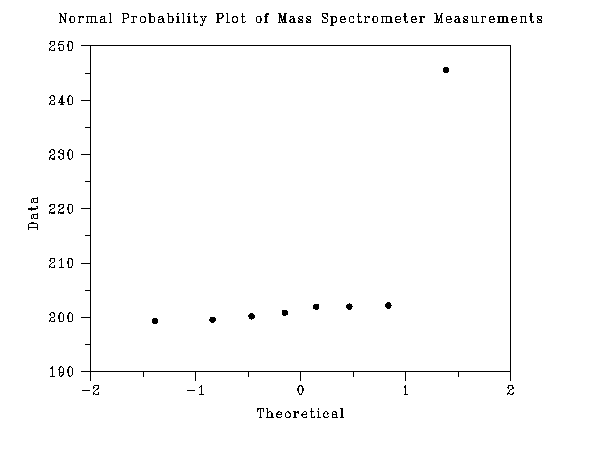1.3. EDA Techniques
1.3.5. Quantitative Techniques
1.3.5.17. Detection of Outliers
1.3.5.17.1. |
Grubbs' Test for Outliers |
Detection of Outliers
If you suspect more than one outlier may be present, it is recommended that you use either the Tietjen-Moore test or the generalized extreme studentized deviate test instead of the Grubbs' test.
Grubbs' test is also known as the maximum normed residual test.
| H0: | There are no outliers in the data set |
| Ha: | There is exactly one outlier in the data set |
| Test Statistic: |
The Grubbs' test statistic is defined as:
This is the two-sided version of the test. The Grubbs' test can also be defined as one of the following one-sided tests:
|
| Significance Level: | α |
| Critical Region: |
For the two-sided test, the hypothesis of no outliers is
rejected if
For one-sided tests, we use a significance level of level of α/N. |
-
199.31 199.53 200.19 200.82 201.92 201.95 202.18 245.57

This plot indicates that the normality assumption is reasonable with the exception of the maximum value. We therefore compute Grubbs' test for the case that the maximum value, 245.57, is an outlier.
H0: there are no outliers in the data
Ha: the maximum value is an outlier
Test statistic: G = 2.4687
Significance level: α = 0.05
Critical value for an upper one-tailed test: 2.032
Critical region: Reject H0 if G > 2.032
For this data set, we reject the null hypothesis and conclude
that the maximum value is in fact an outlier at the 0.05 significance level.
- Is the maximum value an outlier?
- Is the minimum value an outlier?
Checking for outliers should be a routine part of any data analysis. Potential outliers should be examined to see if they are possibly erroneous. If the data point is in error, it should be corrected if possible and deleted if it is not possible. If there is no reason to believe that the outlying point is in error, it should not be deleted without careful consideration. However, the use of more robust techniques may be warranted. Robust techniques will often downweight the effect of outlying points without deleting them.

